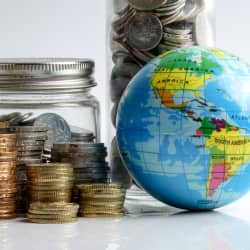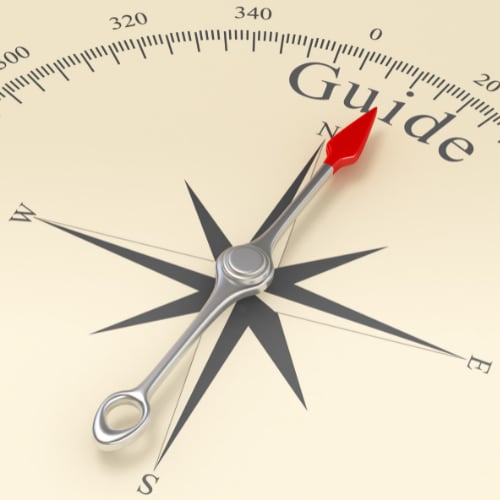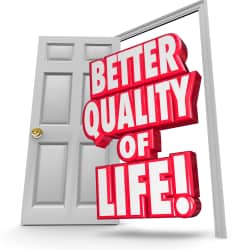
The Global Wellness Economy
The use of the term wellness has been growing exponentially over the past decade, but what does it mean? What is the definition of the wellness economy? Why is the global wellness industry worth US$4.5 trillion?
In a nutshell, wellness is the practice of daily habits that improve your well-being - both mental and physical. According to the World Health Organization, the definition of wellness is "a state of complete physical, mental and social well-being and not merely the absence of disease or infirmity."
There are several areas of a person's well-being which contribute to overall wellness. These include nutrition, exercise, sleep, social connectedness, and mindfulness. Taking care of each of these aspects of health help with the optimization of a person's well-being.
Key Sectors in the Wellness Industry
The global wellness industry includes the fitness and beauty industries. The industry also includes the nutrition and weight loss industries, wellness tourism (retreats and spa visits), workplace wellness, and wearable fitness trackers.
A subsection of the wellness economy is the mental wellness economy, valued at US$121 billion. The Global Wellness Institute claims mental wellness is "an internal resource that helps us think, feel, connect, and function. It is an active process that helps us to build resilience, grow, and flourish." The mental wellness economy includes the below sectors:
Senses, Spaces, and Sleep
This section covers businesses that sell products to optimize sleep. This includes but is not limited to mattresses, eye masks, smart bedding, and sleep tracking apps. It also includes products that enable people to destress using sensory experience. This can be anything from scents and diffusers to white noise, noise cancellation, weighted blankets, and floatation tanks.
Brain-Boosting Nutraceuticals and Botanicals
This sector covers supplements and superfoods that help boost well-being, energy levels, and brain function. It also includes the booming CBD industry. The vast array of CBD and canna oil products claim to help people calm their anxiety and get better sleep.
Self-Improvement
Self-improvement means books, online courses, and videos that teach people how to optimize their lives.
Other products included in this sphere are in-person events run by wellness industry leaders. These events include talks and seminars that offer actionable advice to attendees.
Meditation and Mindfulness
Meditation is a well-known aspect of mental wellness. This subsection of the wellness industry includes apps, meditation teachers, retreats, and items such as mindful coloring books. There is also a large market for various meditation accessories such as bolsters, blankets, chimes, beads.
The State of the Global Wellness Economy
The wellness industry was booming in 2020. It has been growing almost twice as fast as global economic growth, with a 6% growth in 2017 (global economic growth is 3%).
When the Global Wellness Institute carried out a study of wellness economic statistics in 2017, it contributed to 5.3% of global output. This number has continued to increase in the last three years as the wellness economy has sustained continued growth.
The US has the largest market for wellness, last valued at $52.5 billion. China is the second-largest market for wellness, valued at $19.9 billion. Australia is next with a $9.5 billion value, then the UK with $9 billion, and Germany with $6.4 billion. According to predictions, China will take the lead in the next five years.
Why Has Wellness Become So Important?
Countries are more frequently measuring their citizens' happiness. With the publication of reports such as the World Happiness Report, there is no denying well-being has shifted up on the global agenda.
Governments have started to connect citizens' health to productivity. Health care systems around the world are overburdened; the onset of the 2020 pandemic has highlighted this. There is more of a cultural shift to preventing disease than just medicating once the disease is detected.
High-stress work-lives and unhealthy diets mean the nation's health has deteriorated over the last few decades. The invention of fast food and poor dietary choices mean people are in their worst health. According to estimates, almost 160 million Americans are obese or overweight.
Children are also overweight; 30% of American children have a high BMI, which is up 21% from 1990. People are time-poor due to overwork, making it harder to make conscious and healthy decisions about nutrition.
The population is waking up because poor lifestyle choices have long-term impacts on their lives. It's not just long term chronic illness that is being affected by poor lifestyle choices but the ease of daily life.
With better nutrition and exercise choices comes better sleep. With better sleep comes less stress. Simple steps can help people to show up in their daily lives as the best versions of themselves. This leads to more clarity and focuses at work and better relationships with those they love.
Stress, loneliness, overwork, and a poor work-life balance are becoming bad for mental health, too. As a result, many people are heading towards burnout. People have started to turn to alternative therapies to improve their well-being. Culturally, there has been a much more open dialogue about mental well being, understanding it, and taking care of it.
Technology and Wellness
Technology has also made access to information about health and well-being easier and more accessible. Offerings such as apps to guide meditation, apps that track sleep, track calorie intake, steps, and activity levels. Everyone has the ability to see how much they move just by looking at a device. People have never had it easier when it comes to having data on how well the body functions.
Another reason the wellness economy is booming is likely due to digital media. People now have information about their health on demand and can find information with the click of a button.
Social media has also influenced the growth of the wellness industry. Social media tends to show optimized versions of people's lives. In turn, it may encourage users to be the best versions of themselves and make an effort to live better.
Digital media is a great tool to get inspiration and ideas of things that can contribute to well-being. Whether that's using a recipe, completing a guided meditation, work out, or something larger such as going on a wellness retreat.
Global Wellness Economy Trends
As the global pandemic has turned normal life upside down, people's mental health and wellness, in particular, has suffered. As a result of global deteriorating mental health wellness, the industry will step up. The plethora of tools available to help improve mental well-being will only continue to increase in the next few years.
It's not only the mental wellness sector that will continue to grow. It is predicted that the physical activity economy will be worth $1.1 trillion by 2023. There is an ever-increasing number of fitness apps and trackers released onto the market every day. As a result, technology is predicted to be the second fasted growing wellness market.
With the closure of many gyms and fitness studios due to the pandemic, virtual fitness training has become one of the stands out trends of 2020. Exercise at home will only continue in 2021 as people become comfortable with working out in their own homes.
It is estimated the sale of fitness equipment increased by 170% at the beginning of the pandemic. Manufacturers could not keep up with consumer demand.
Trends in Workplace Wellness
Sitting for long periods of time can actually increase the chances someone will get diabetes or cancer. It can also affect their brain function. The Global Wellness Institute predicts that employee unwellness costs the global economy 10-15% of the economic output.
- Workplaces are increasingly offering wellness programs to take care of the well-being of their employees. Employers finally realize that the sedentary lifestyle of many office workers is detrimental to their long term health.
- Employers are increasingly providing gym memberships, free yoga, and meditation classes and encouraging workers to take more exercise.
- Wellness programs help increase worker productivity, reduce stress, and improve employee engagement. It is estimated that 79% of US employers offer a wellness program. The amount spent on healthcare is less for companies that have a wellness program.
- Flexible working setups will increase as more workers do their work at home due to the pandemic. Flexible hours and no commute every day are proven to have a positive impact on employees' well-being.
Spa Industry Growth Trends
- The spa industry is one of the largest contributors to the wellness economy. It has been growing at a consistent 10% yearly rate since 2017. By 2022 it is expected to be worth $128 billion.
- The spa industry employs approximately 2.5 million workers globally. The top 5 markets are the USA, China, Germany, France, and Japan.
- The mineral and thermal spring industry have also been growing rapidly at 4.9% annually since 2017. It is expected to reach $77 billion in revenue by 2022. 95% of the revenues are made from establishments in Europe and Asia-Pacific. More specifically, China, Japan, and Germany.
Wellness Tourism Trends
- Wellness tourism is considered to include fitness holidays, yoga and meditation retreats, and self-improvement holidays. 17% of global tourism is wellness tourism.
- As of 2017, Wellness tourism was a $639 billion market, which is predicted to grow to $919 billion by 2022. Wellness tourists tend to spend 53% more on a trip than a typical tourist. The price tag for a wellness holiday is often high, which makes this a lucrative business.
With the travel bans and countrywide lockdown restrictions that have been put in place in 2020 and the beginning of 2021, people are desperate to book a getaway. Many will want to book travel, which contributes to their mental and physical well-being.
The retreats business in 2022 is going to boom. A travel renaissance is on the horizon; people will travel more mindfully and in a way that will positively impact their lives in a more long term way.
Wellness Real Estate
Wellness real estate means homes built by communities who want to live in a way that promotes wellness. It is predicted the market for this type of residence will be worth $198 billion in 2022.
Mental Wellness Economy Trends
The mental wellness economy is also projected to continue growing at an exponential rate. With meditation apps such as Calm valued at $1billion, the business of digitally guided meditation is here to stay.
Good quality sleep is integral to weight loss, lower stress levels, and higher productivity. Sleep startups are another growing trend, with numerous products, technology, and apps appearing on the market. Their main goal - to help people get the best night's sleep possible. Optimizing sleep has long been a struggle for many people, but new technologies are changing this.
Trends in Supplements and Superfoods
People are becoming more concerned about their nutrition and ensuring their bodies are getting the correct nourishment. Data from Google searches show that the interest from consumers in superfoods grew rapidly in 2020. This category alone is projected to grow to $5.61 billion by 2024.
The Future of Wellness
The wellness economy will only continue growing over the next five years. Health habits and behaviors have been challenged as a result of the pandemic.
More and more people are looking for ways to improve their mental and physical wellness. There are thousands of companies worldwide that aim to help people do this. Whether selling a product, service, or experience, the business of wellness companies is booming.
Making small incremental changes over a long time is how people can improve their long-term well-being and prevent disease. Feeling physically strong can, in turn, help with feeling mentally healthy.
What is integral to wellness? Good nutrition, taking supplements, quality sleep, stress management, and exercise. Our online health education program is an excellent way to get started on your wellness journey.

Jay Todtenbier is one of the founders of SupplementRelief.com in 2010 and has operated the business ever since. He is also a tennis instructor and gospel musician. Formerly, he spent 25 years in business development, technology, and marketing with startups and major corporations, having gone through the tech boom in Silicon Valley in the 90s. He became passionate about and began studying and practicing Wellness as a Lifestyle after experiencing chronic, personal health challenges, including depression, auto-immune disorders, and being overweight, which impacted his ability to live a healthy, vibrant life. Since then, he has advocated for healthier living, encouraging others to live better by making small, gradual changes to lifestyle behaviors relating to whole-food nutrition, stress management, reasonable exercise, proper sleep, and targeted high-quality supplements.
Learn more about Jay Todtenbier.
-
 Discussion Forum
Questions or Feedback?
Discussion Forum
Questions or Feedback?Ask questions. Share your thoughts. Note that we cannot answer questions relating to specific medical conditions - please refer those to your qualified healthcare provider.
Post a new Comment or Reply to an existing one. Help for using the Discussion Forum.
 Discussion Forum Help
Discussion Forum Help
Comments are displayed in order of the last one posted so the most recent one is at the top and the oldest one at the bottom.
Replies within a Comment are displayed in reverse order with the oldest one at the top and the most recent one at the bottom.
Each post identifies
 who made the post and the
who made the post and the  date and time the post was made.
date and time the post was made.Mouse over the icons for tooltips that explain what they mean.

If you see this icon you can attach an Audio file to your post.

If you see this icon you can attach a Document file to your post.

If you see this icon you can attach an Image file to your post.

If you see this icon you can attach a Video file to your post.
You will see the
 Ban icon (Report Post as SPAM) immediately following the Timestamp of the post. Click this icon if you feel strongly that the content posted is not appropriate and should be reviewed by the Forum Moderator. You will be provided with a confirmation dialog to be sure you wish to submit this post for review. If submitted, the Forum Moderator will be notified to review the post and will determine what type of action to take.
Ban icon (Report Post as SPAM) immediately following the Timestamp of the post. Click this icon if you feel strongly that the content posted is not appropriate and should be reviewed by the Forum Moderator. You will be provided with a confirmation dialog to be sure you wish to submit this post for review. If submitted, the Forum Moderator will be notified to review the post and will determine what type of action to take.Click
 in the upper right corner of this Help modal or anywhere on the web page outside of the modal to exit Help.
in the upper right corner of this Help modal or anywhere on the web page outside of the modal to exit Help.
![]() Session Expired from Inactivity
Session Expired from Inactivity
Do you want to?
9618 Jefferson Highway, Suite D-191
Baton Rouge LA 70809-9636
(888) 424-0032 |
support@supplementrelief.com
* Disclaimer: This page is available exclusively for SupplementRelief.com clients. None of the information on this website is intended to replace your relationship with your healthcare provider(s). Nothing should be considered medical advice. The information, knowledge, and experience shared on this website are the opinions of SupplementRelief.com. This site and its content are intended to enhance your knowledge base as YOU MAKE YOUR OWN HEALTHCARE DECISIONS in partnership with your qualified health professional.
* These statements have not been evaluated by the Food and Drug Administration. These products and services are not intended to diagnose, treat, cure, or prevent disease.
* There is NO GUARANTEE OF SPECIFIC RESULTS for the products or services offered, and the RESULTS CAN VARY for each individual. Any results claimed by our customers are based on individual experiences that are unique and cannot be guaranteed.
FirstFitness Nutrition and NuMedica may be promoted and sold on the internet ONLY by Authorized Resellers who have been approved by and have registered their website domain with these companies. They strictly prohibit, and actively monitor, the UNAUTHORIZED SALE or RESALE of their products in ALL online public shopping portals including Amazon, eBay, and others and into other countries. All products purchased in SupplementRelief.com are for PERSONAL USE ONLY and CANNOT BE RESOLD to others. Please report violations of Reseller Policy directly to FirstFitness Nutrition at 800.621.4348 and to NuMedica at 800.869.8100.
The content and photographs on this website are copyrighted or Licensed Material and may not be downloaded for other than personal use. Republication, retransmission, reproduction, or any other use of the content or photographs is prohibited. ©2010-2024 SupplementRelief.com.
Are you sure you want to remove this item?








